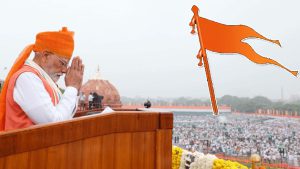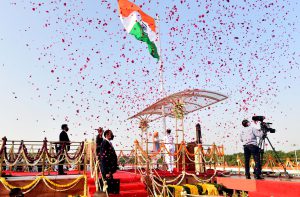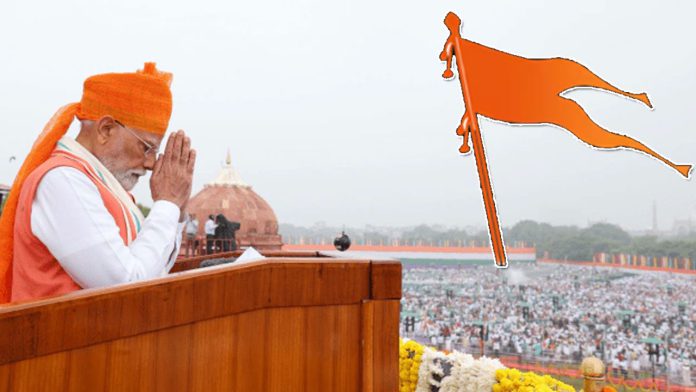Meta Description: Independence Day speech of PM Modi at Red Fort sparks controversy as history is reshaped, RSS glorified, and Savarkar placed above Gandhi, raising concerns over India’s ideological direction.
By. Dr. Mohammad Farooque
Independence Day Speech Breaks Records, Stirs Debate
Independence Day Speech by Prime Minister Narendra Modi this year at the Red Fort was more than just a ceremonial address—it was a calculated political performance. On August 15, 2025, Modi delivered a marathon 103-minute address, surpassing his own previous record of 98 minutes last year and setting the mark for the longest Independence Day speech in Indian history. Before him, his 2016 speech of 96 minutes, Jawaharlal Nehru’s historic 72-minute address in 1947, and I.K. Gujral’s 71-minute speech in 1997 were the longest on record. By contrast, Nehru in 1954 and Indira Gandhi in 1966 kept it to just 14 minutes—the shortest ever. With twelve consecutive speeches from the Red Fort, Modi has now overtaken Indira Gandhi’s streak, standing just behind Nehru’s record of seventeen.
RSS at the Center of the Narrative



Yet the real storm around this Independence Day Speech wasn’t about its length—it was its content. Modi openly praised the Rashtriya Swayamsevak Sangh (RSS) on its centenary, calling it the world’s largest NGO and saluting its role in “nation-building.” This statement triggered immediate backlash. Critics pointed out that the RSS was banned after Mahatma Gandhi’s assassination and has often been linked with communal polarization. Congress leader Jairam Ramesh called Modi’s remarks a betrayal of the freedom struggle and an insult to martyrs, accusing him of trying to appease the RSS ahead of its upcoming 75th anniversary. CPI(M) general secretary Mariam Alexander Baby described it as an attack on national unity, while Asaduddin Owaisi reminded the public that the RSS never participated in the freedom struggle but instead sided with colonial rulers.
Savarkar Above Gandhi: A Poster Sparks Outrage
Adding fuel to the fire was a Petroleum Ministry poster that placed Vinayak Damodar Savarkar’s portrait above Mahatma Gandhi’s, followed by Bhagat Singh and Subhas Chandra Bose. The Congress condemned it as blatant distortion of history and an insult to leaders like Nehru and Patel. Party spokesperson Pawan Khera quipped that after blending ethanol into petrol, the government was now “mixing” freedom fighters. K.C. Venugopal called it Orwellian revisionism, where traitors are painted as heroes and true heroes pushed aside. Supriya Shrinate rejected the idea of placing Savarkar above Gandhi, calling it an assault on the dignity of India’s martyrs.
The Ideological Offensive
This Independence Day Speech and the poster together point to something deeper: an ideological offensive. Savarkar symbolizes Hindutva nationalism, while Gandhi represents nonviolence and pluralism. Elevating one while diminishing the other is more than symbolism—it is narrative engineering. Modi’s critics argue that every Independence Day now comes with attempts to reshape history, sideline Nehru, Patel, and Gandhi, and glorify figures aligned with the ruling party’s ideological roots. Is this a coincidence, or a deliberate project? When the Prime Minister praises the RSS from the Red Fort and the government promotes Savarkar over Gandhi, the message is unmistakable: history is being rewritten to suit today’s politics.
The Cost of Distorting History
Recasting history in this way is a dangerous slope. It risks erasing the true spirit of India’s freedom struggle—justice, equality, and tolerance. Behind the slogans and flags of Independence Day, a silent campaign of ideological capture is underway, slowly reshaping collective memory. Such manipulation is not just an academic issue—it strikes at the intellectual security of the nation, as threatening as any external danger.
If left unchallenged, future generations may accept as truth only what is sanctioned by power, not what was written in sacrifice. Independence Day celebrations, instead of uniting, are being turned into tools for rewriting history. The real question is no longer how long this will continue—but how long society will stay silent.







